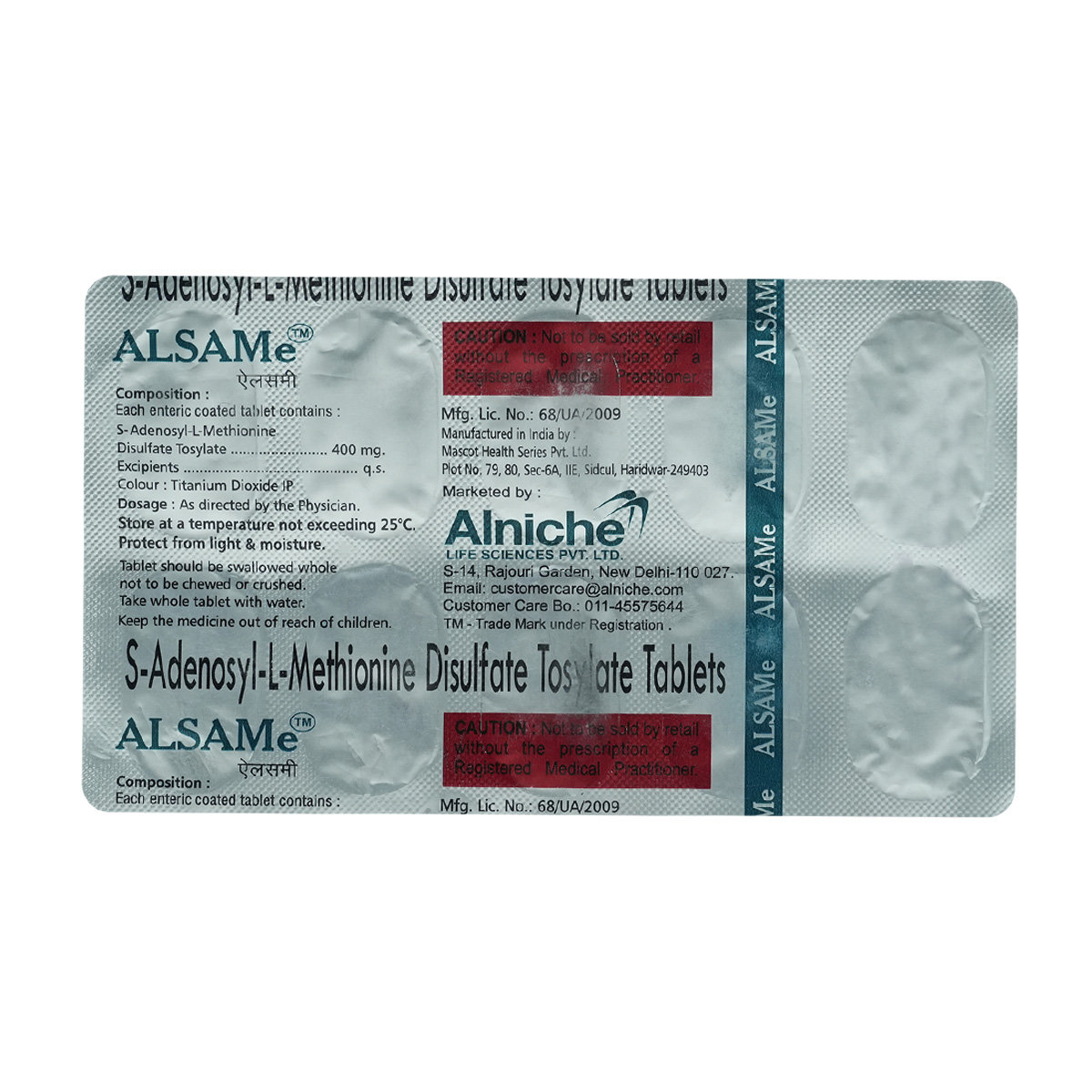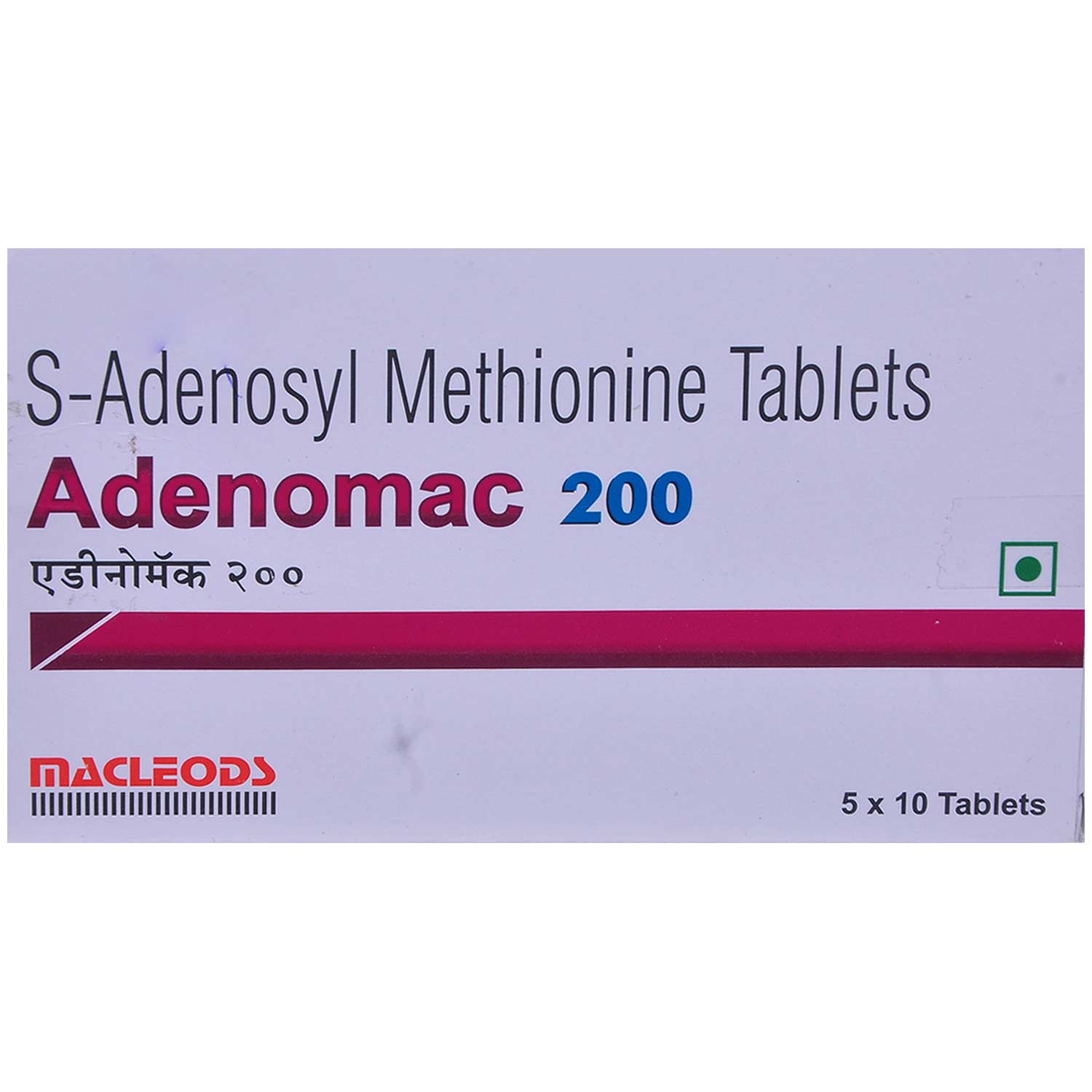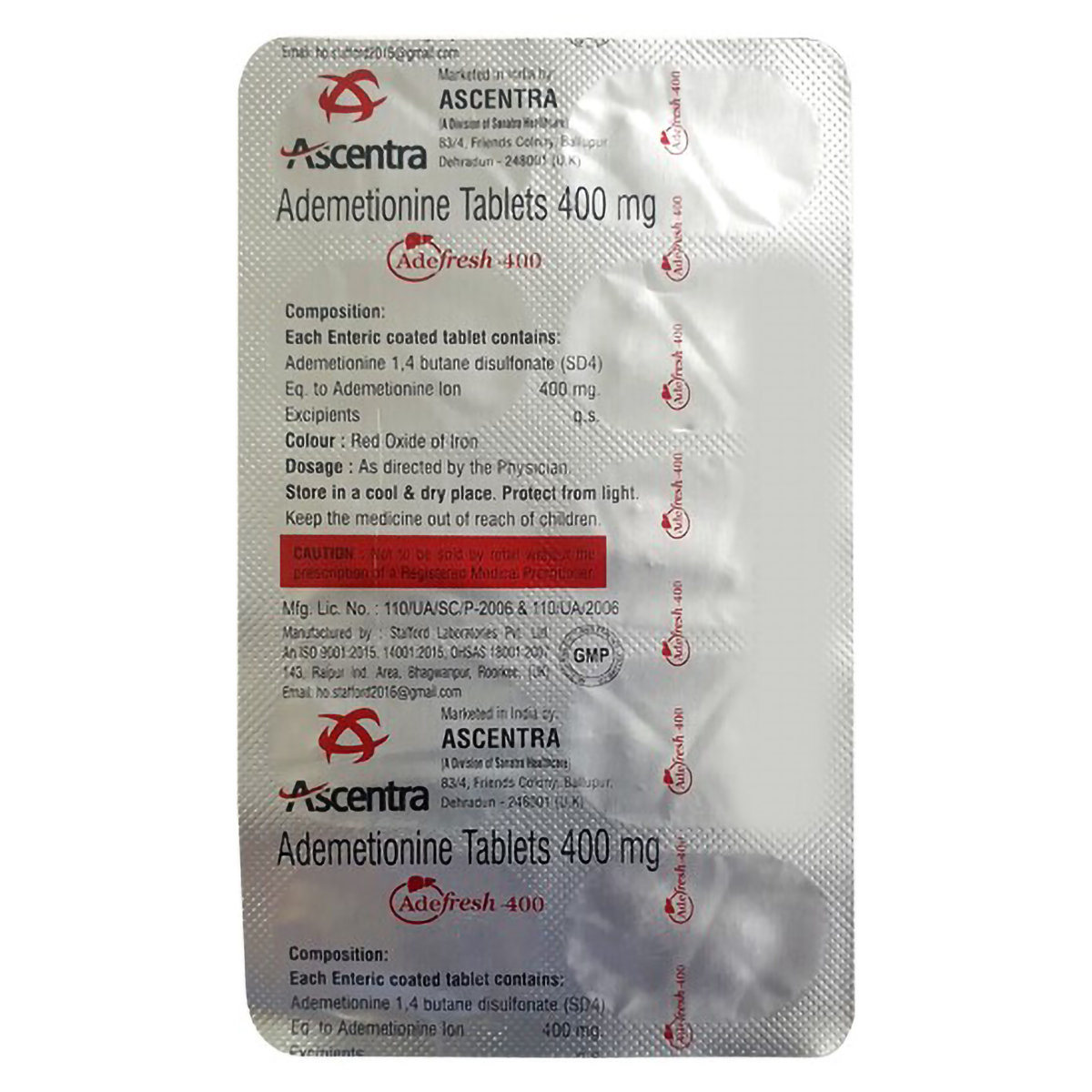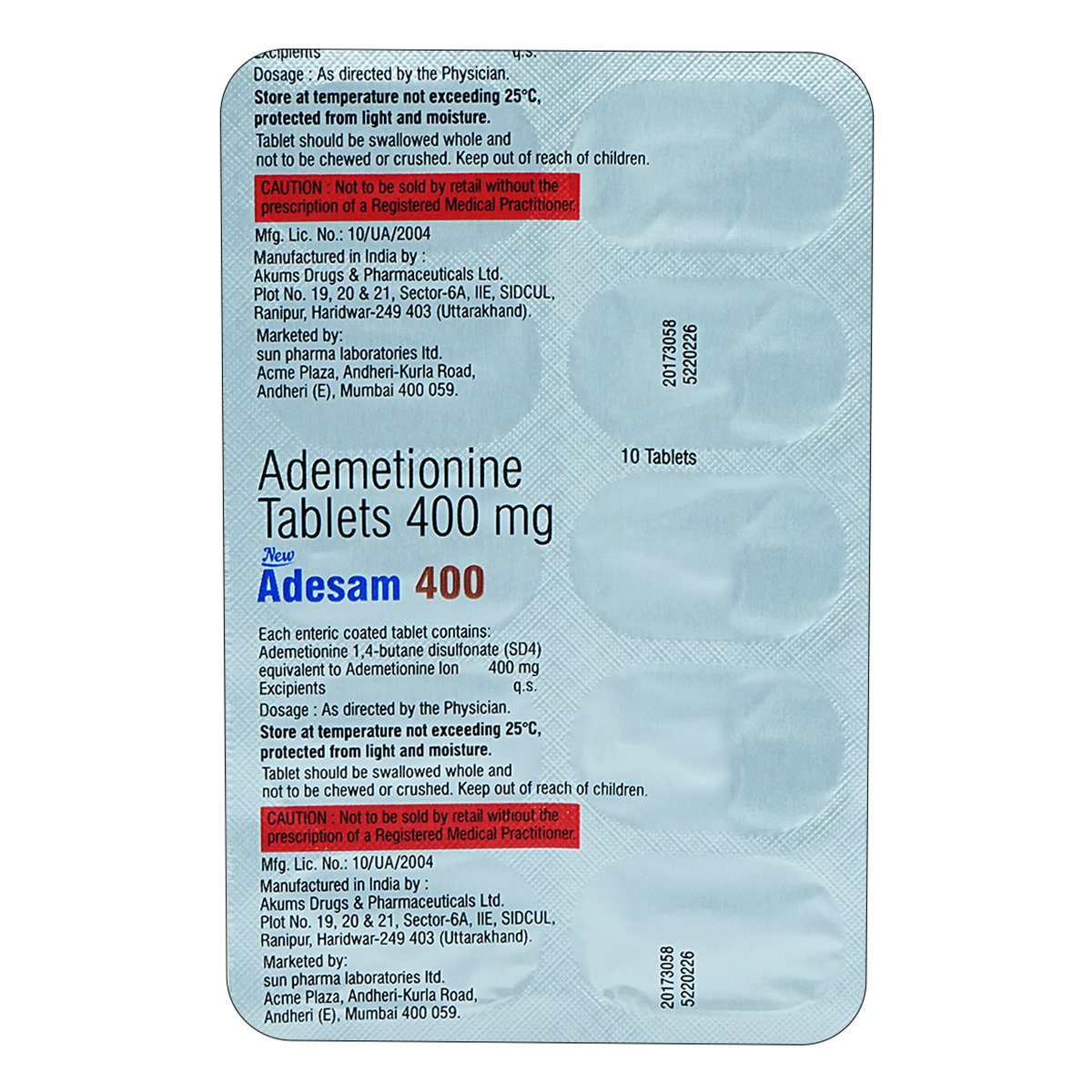Ademetionine
About Ademetionine
Ademetionine belongs to the class of medication called Nutritional supplements used to treat various medical conditions, including depression, reduce pain and swelling in the joints conditions such as osteoarthritis, biliary cholangitis (an autoimmune disease of the liver), excess cholesterol in bile and biliary and liver diseases caused by cystic fibrosis. It is also used to treat liver disease during pregnancy, improve symptoms in people with fibromyalgia, and treat nerve problems in people with AIDS or sexual dysfunction in men with depression.
Ademetionine contains Ademetionine, a naturally occurring substance found in cells, tissue, and body fluids. It is produced from methionine (amino acid) and is used to treat liver disease, depression, and osteoarthritis. Ademetionine ensures sufficient levels of glutathione in the liver are maintained to minimize liver damage. It also prevents the increase of lipids associated with cirrhosis outside the liver. It also affects certain chemical messengers (serotonin) in the brain, which communicate between brain cells, regulating mood and treating depression. It stimulates the production of parts of cartilage, reduces the inflammatory mediator, and has painkilling properties.
Take Ademetionine as recommended by your doctor. In some cases, you may experience common side-effects such as abdominal discomfort, abdominal pain, diarrhoea, nausea, dizziness, and insomnia. Most of these side effects do not require medical attention and will resolve gradually over time. However, you are advised to talk to your doctor if you experience these side effects persistently.
Do not discontinue Ademetionine without consulting your doctor. Do not take Ademetionine if you are pregnant or breastfeeding unless advised. Ademetionine can be given to children with extreme caution if recommended by the doctor. Avoid consuming alcohol with Ademetionine as it could lead to increased drowsiness and liver damage. Keep your doctor informed about your health condition and medicines to rule out any side effects.
Uses of Ademetionine
Medicinal Benefits
The Ademetionine contains Ademetionine, a naturally occurring substance in cells, tissue, and body fluids. It is produced from methionine (amino acid) and is used to treat liver disease, depression, and osteoarthritis. In liver disease, Ademetionine ensures sufficient glutathione levels in the liver to minimize liver damage. It also prevents the increase of lipids associated with cirrhosis outside the liver. In depression, it affects certain chemical messengers (serotonin) in the brain, which communicate between brain cells, thereby regulating mood and treating depression. In osteoarthritis, It stimulates the production of cartilage parts, reduces the inflammatory mediator, and has painkilling properties. Ademetionine is also effective in treating liver disease during pregnancy, improving symptoms in fibromyalgia, treating nerve problems in people with AIDS, or sexual dysfunction in men with depression.
Directions for Use
Storage
Side Effects of Ademetionine
- Headache
- Dizziness
- Feeling anxious
- Vomiting
- Stomach upset
- Diarrhoea
- Constipation
- Insomnia (sleep problem)
- Increased sweating
Drug Warnings
Do not take Ademetionine if you are allergic to any of its contents, if you have used an MAO inhibitor in the past 14 days, if the inflammation of gall bladder and bile ducts, narrowing or blockage of bile ducts, biliary colic, calcified gallstones, improper constriction of the gallbladder, gastric or duodenal ulcer. Inform your doctor if you have heart disease, seizure disorders, bone marrow suppression, diabetes, schizophrenia, bipolar disorder, acute alcohol intoxication, glaucoma, thyroid problems, or kidney and liver problems. Do not take Ademetionine if you are pregnant or breastfeeding unless advised by your doctor. Ademetionine can be given to children with caution if recommended by the doctor. Avoid consuming alcohol along with Ademetionine as it could lead to increased drowsiness and liver damage. Keep your doctor informed about your health condition and medicines to rule out any unpleasant side effects.
Drug Interactions
Drug-Drug Interactions: Ademetionine may have interaction with monoamine oxidase inhibitors (medicines used to treat depression) (moclobemide, phenelzine, iproniazid, isocarboxazid, nialamide, tranylcypromine, selegiline), an antidepressant (bupropion, duloxetine, fluoxetine, sertraline), antiparkinsons (levodopa), pain killers (tramadol, trazodone, hydrocodone, oxycodone, acetaminophen).
Food-Drug Interactions: No interactions found/established.
Drug-Disease Interactions: Ademetionine may interact with bipolar depression, Parkinson's disease, biliary obstruction and liver impairment, variceal bleeding (high blood pressure in portal veins), ascites (excess abdominal fluid), and liver encephalopathy.
Drug-Drug Interactions Checker List:
Safety Advice

Alcohol
cautionAvoid consumption of alcohol while taking Ademetionine as it may cause increased dizziness and liver damage.

Pregnancy
cautionAvoid taking Ademetionine if you are pregnant unless advised by a doctor. Please consult your doctor if you have any concerns regarding this, your doctor will recommend only if the benefits outweigh the risks.

Breast Feeding
cautionConsult your doctor before taking Ademetionine, your doctor will decide whether Ademetionine can be taken by breastfeeding mothers or not.

Driving
cautionAdemetionine does not affect your ability to drive. However, you are advised to be cautious while driving if you experience dizziness.

Liver
cautionDose adjustment may be needed in patients with liver impairment. Please consult your doctor if you have a liver impairment or any concerns regarding this.

Kidney
cautionDose adjustment may be needed in patients with kidney impairment. Please consult your doctor if you have kidney impairment or any concerns regarding this.

Children
cautionAdemetionine can be given to children with caution only if recommended by the doctor.
Habit Forming
Diet & Lifestyle Advise
Liver disease:
- Include foods such as bell peppers, citrus fruits, leafy vegetables, tomatoes, milk, fish, low-fat dairy, beans, nuts, lentils, tofu, and tempeh in your diet.
- Foods rich in vitamins B and C and calcium are good for the gallbladder.
- Plant-based protein foods such as beans, nuts, lentils, tofu, and tempeh help prevent gallbladder disease.
- Avoid high-fat, trans-fat, processed foods, white bread, white pasta, and sugars.
- Avoid tobacco and alcohol consumption.
Depression:
- Maintaining a healthy diet and regular exercise helps improve overall health and boost self-esteem.
- Perform meditation and yoga. This helps in relieving stress and provides relaxation.
- Follow a regular sleep pattern to improve the amount and quality of sleep you get.
- Include foods rich in omega fatty acids such as fish, nuts, fresh fruits, vegetables, and olive oils.
- Neurotransmitters are made up of amino acids. Amino acid-rich foods such as meat, dairy products, and certain fruits and vegetables help properly maintain neurotransmitters.
- Avoid smoking and alcohol consumption.
Osteoarthritis:
- Physical activity helps strengthen muscles and relieves joint stiffness. Gentle activities like 20-30minutes of walking or swimming would be helpful.
- Performing yoga may also help in improving joint flexibility and pain management.
- Follow heat or cold therapy, and apply a cold or hot compress on the joints for 15-20minutes regularly.
Special Advise
- Your doctor may advise a regular liver function test to monitor the liver's function and the treatment progress.
- Do not use Ademetionine if you have used an MAO inhibitor (antidepressant) in the past 14 days, as a dangerous drug interaction could occur.
Patients Concern
Disease/Condition Glossary
Primary biliary cholangitis: Primary biliary cholangitis, formerly known as primary biliary cirrhosis, is an autoimmune disease caused by bile duct damage in the liver. Bile ducts are the small channels that carry the bile (digestive fluid) from the liver to the small intestine, where it breaks down fats and aids in its absorption. Biliary cirrhosis causes a build-up of bile in the liver, which leads to liver damage.
Depression: Depression is a mood disorder characterized by sadness, unhappiness, anger, hopelessness, or loss that interferes with a person’s daily activities. Depression can also influence some chronic health conditions and relationships. The exact cause of depression is unknown, but it may be associated with mental problems, trauma, family history, drug use, and medical conditions.
Osteoarthritis: Osteoarthritis is a degenerative joint disease in which the two ends of the joints come together due to the breakdown of a protective covering of cartilage. Due to the absence of this protective covering, the joints rub against each other, leading to pain and stiffness. Symptoms of osteoarthritis include pain, stiffness, inflammation, and tenderness. The main reason for osteoarthritis is age. The older you are, the more likely you could get osteoarthritis, thus known as degenerative disease, meaning that the joints wear out as a person ages. Other reasons include a past injury such as torn cartilage, dislocated joints, and ligament injuries.
FAQs
Ademetionine contains Ademetionine is used in the treatment of liver disease, depression, and osteoarthritis. It is used in liver conditions associated with reduced bile formation (intrahepatic cholestasis). It restores the balance of serotonin, a natural chemical present in the brain. It also blocks the production of certain inflammatory chemical substances that cause pain and swelling in osteoarthritis.
If you miss a dose, take it as soon as you remember. However, if it is time for the next scheduled dose, skip the missed dose and follow your usual dosage.
Do not discontinue Ademetionine without consulting your doctor. To treat your condition effectively, continue taking Ademetionine for as long as advised. Do not be reluctant to speak with your doctor if you feel any difficulty while taking Ademetionine.
Do not take Ademetionine if you have used MAO inhibitors (like isocarboxazid, linezolid, methylene blue injection, phenelzine, rasagiline, selegiline, tranylcypromine, and others) in the last 14 days as the co-administration of Ademetionine and MAO inhibitor cause serious drug interaction. Let know doctor know about this.
No, the Ademetionine does not cure arthritis. Ademetionine is only used to relieve symptoms of arthritis, such as joint pain, swelling and stiffness.








